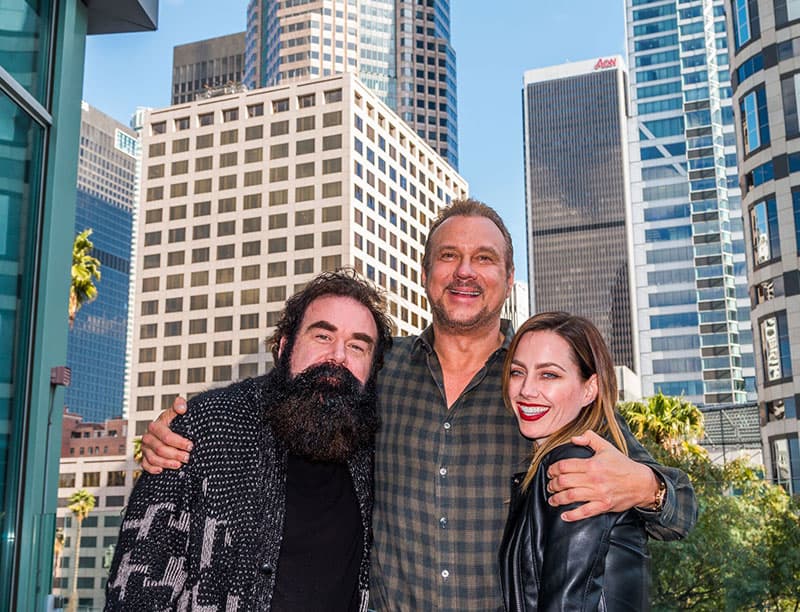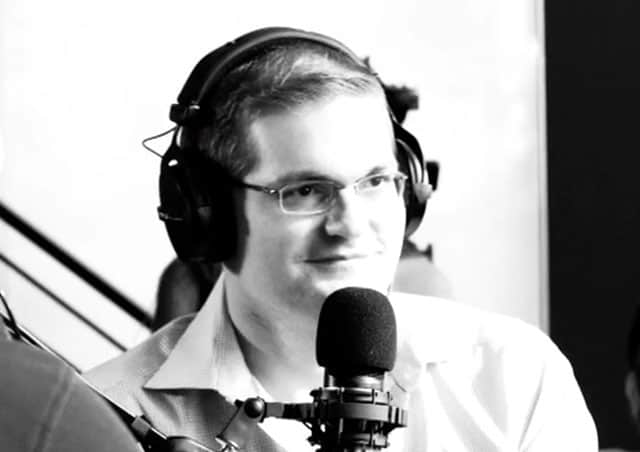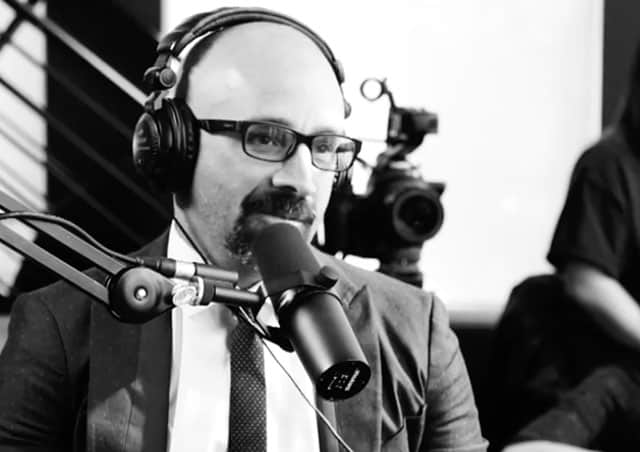Take Out the Mind Trash to Succeed In Business
What I love about the Business Outlaws podcast is that BigMike Straumietis, Chris Collins and host Jamie Foxx expose insider secrets that help you expand your personal and business life. They understand how these elements intertwine to help you master your personal life to become a business leader. This process is ongoing, and you must always find methods to eliminate the obstacles that can derail you.
In Episode 9 of Business Outlaws, “Taking Out The Mind Trash,” these high achievers share insights from their own lives and careers about how to achieve success. From practical tools to useful advice that most people pay thousands of dollars to hear at leadership seminars, these guys give away for free the most important insights, because they know what it’s like to start from the bottom.
Take the time to listen to Episode 9, because hearing these business powerhouses share their insights with such spectacular clarity is like watching a lightning storm in the mountains. If you’re short on time, though, here are the highlights to discuss with your friends and put into action now.
What Is Mind Trash?
I love this term coined by BigMike because it sounds like exactly what it is. Mind trash is the thoughts and habits that interfere with your performance in both your personal and professional life. These are self-defeating attitudes and beliefs that someone pushes on you and that you come to believe.
Mind trash clouds your thoughts, skews your judgement and throws you off your game. Mind trash undermines your confidence and makes you second guess your instincts. It can make you blame other people or circumstances for performance mistakes and leads you to make poor decisions that impact your personal and professional relationships.
According to BigMike, mind trash holds you back, and dealing with it is an absolute must if you want to achieve your goals. “You can make excuses or you can get shit done,” BigMike says, “but you can’t do both.” So let’s talk about the most important points for creating change in your life.
The Two Key Elements For Mastering Mind Trash
Before you can get to work on any task, you have to accurately assess the situation. Learning to face the truth is the first step in dealing with mind trash.
BigMike says, “What people don’t understand is that you can learn all the marketing business, all the stuff, but if you don’t have the right mindset, you will fail. Our society is set up to program us for defeat, actually. All the shit that we’re told — it does affect us. It’s not only other people’s stuff, but our own stuff as well.”
Other people’s trash and internalized ideas about they perceive you can easily knock you off your game if you don’t recognize the source of these messages. Once you do, you need to get to work on recalibrating your mindset to make a positive shift in your personal life, which will then positively impact your business life. Thankfully, you can develop specific attitudes and use proven tools to help you achieve these goals.
Tuning Up Your Self-Image
Chris Collins says, “More than anything else, how you see yourself, and then how you feel about yourself, determine how you act and what your goals are. A lot of times with people, their goals are small because that’s the image they have of themselves.”
Your self-image dictates what you’ll try to accomplish, because unconscious, self-limiting scripts are playing out in the back of your mind without you even knowing it. Becoming aware of these inherited and self-perpetuating attitudes is important because once you are aware, you can implement strategic change.
BigMike adds, “The people who become really successful in life are the ones who are able to move past that and compartmentalize it or do whatever you have to deal with it.” There are other techniques they discuss for building a strong self-image, but BigMike has a simple idea you can try right now:
“Listen to people who’ve accomplished something. They definitely have a different mindset than the normal person.”
Good thing you’ve already got BigMike and Chris “Bulldog” Collins on your team, so you don’t have to waste your time trying to discover these insights on your own.
Accepting Your Authentic Self
BigMike, Chris and host Jamie Foxx all agree that learning to accept and act from your authentic self is the cornerstone of creating success. Jamie has great insights on this:
“You have to be comfortable with yourself, like when you’re alone, and there’s no TV on, there’s no cellphone, and it’s just you.”
Once you get to this point, it solidifies your self-confidence and shows that you’re a true leader. When you embrace yourself fully, she continues, then you come to a point where you say, “Take it or leave it, this is me. I think it’s not [just] searching for acceptance; it’s searching for self-acceptance.” To do this, you have to own all your strengths and flaws exactly as you are now. Jamie goes on to say, “If that’s who you are, that’s who you are. Accept it and people will buy into what you’re selling. There like, ‘Oh, I believe him because he believes him.’”
This sounds simple, but it’s incredibly important. Once you own who you are, you don’t have to spend time covering up and building a front because people have good in-built BS detectors and they simply won’t trust you.
Once you embrace yourself, things get good. Chris says, “So, there’s this certain liberation to becoming authentic and realizing I’m a go-getter. Maybe everybody isn’t going to like what I do, but I’m going to provide value to the world, as long as my ethics and intentions are pure. That’s the permission that I think a lot of people are waiting for.”
What’s important to realize here is that Chris is also saying people may not give you permission to do what you want to do. The only person who can truly do that is you. And you do that by having an authentic self-image and by taking out the mind trash, over and over, until your mind is uncluttered.
Practical Steps For Taking Out the Mind Trash
OK, so while all these ideas are well and good, what are the practical things you can do now to change your self-image and learn to be your authentic self everyday?
Find A Skilled Psychotherapist
Earlier, BigMike said that successful people learn to move beyond or compartmentalize their mind trash — but how do you do that? With the help of a qualified psychiatric professional. Therapy doesn’t mean you’re nuts. Rather, it means you’ve found a specially trained expert who is helping you with your quest for self improvement.
BigMike is dead accurate when he says, “Everyone’s issues about themselves pretty much come from childhood. It comes from mommy issues, daddy issues, bullying, sexual abuse — those are the big four. You have to deal with all that stuff because you won’t think that you’re good enough, and it goes pretty deep.”
The reality is that you just can’t deal with such issues on your own. You need a trained expert who can provide external perspective and use proven techniques to sift through your experiences, good or bad. Whether you’re on a tight budget or you can afford the best therapy, you need to find a professional who you can trust and who uses a method that works for you.
BigMike goes on to talk about why it’s so important to complete this internal work: “You have to unravel those things because, as you become more and more successful in life, you’re gonna have more shit come at you — it’s not less, it’s more — and you have to be able to discern what’s important and what’s not.” Psychotherapy not only gets you to understand how you work and resolves issues that hold you back, it also makes you more resilient and able to take on the escalating challenges that success will bring.
Understand Your Belief System
You have to understand your belief system and your values because they define who you are. The real trick is understanding what you’ve passively taken in versus what you’ve learned to be true through your experience.
Chris puts it another way: “I think an important thing to ask yourself about is what your belief system is. Is your belief system something somebody told you and conditioned you to buy into? Did our school system or society or Fox News, condition you, or is it something you know first-hand? Because, usually what you learn first-hand is different than what everybody else is trying to get you to believe.”
This self-reflection links to the therapy used to fortify your self-image and authentic self. Asking these hard questions to discern your core beliefs will define you and guide many of your business and personal decisions. Once you go through this process, it will become intuitive and help to build your successes.
Use High-Performance Visualization Techniques
BigMike and Chris are big fans of surgeon Maxwell Maltz’s book Psycho-Cybernetics. (BigMike is an avid reader. Check out his top book recommendations for business success.) Maltz discovered that if you’re in a relaxed state and consistently imagine a situation you’d like to manifest in your life, you greatly increase the chance of it becoming real. At the same time, you have to take concrete steps to achieve this goal, but the visualization plants the idea in your subconscious and it starts to grow from there.
How well does this technique work? Olympic athletes and high-achieving leaders in every industry still use his techniques to this day to create success. BigMike does it all the time. He says, “Think of it as a TV set, the picture. Make it as sharp and crystal clear as you can, and run it over and over and over in your head.”
As you practice this technique consistently and feel more confident as you see the results infiltrate your life, you can use it to fortify your successes. But the key is to act on the visualization. Chris further drives this point home: “Visualize it to the point that you can’t not take action. Like you jump out of bed every morning, because it becomes a cause bigger than you and includes you.”
One of the most mind-blowing elements of this particular episode is how all of these personal development ideas compound on one another. When you go through all of the steps outlined here and don’t take shortcuts, you are completing the steps to reinvent yourself. Toward the end of this episode, BigMike says, “I invented this guy you see in front of you. This was a transformation.” And Chris immediately follows him up by stating, “And then at every level of success, you kind of reinvent yourself.”
The Business Outlaws Share Hard-Won Insights
What makes the Business Outlaws different to any other businessman is that their insights come directly from experience. They’ve done all the necessary legwork in addition to mastering their respective industries. It’s also what makes their podcast such a valuable resource for up-and-coming leaders like you.
Here are key business insights to utilize as you build your pathway to success.
Expect And Use Failures Properly
Chris says, “In every great story of the hero’s journey, there was a big, huge failure right before the finish line. You almost have to expect that. It’s happened since the beginning of time.” There will always be setbacks in your personal and business life, but these guys know you have to keep at it.
BigMike believes determination and discipline are the elements that will see you through, and that have definitely worked for him. Jamie states very succinctly toward the end of the episode that “success is a reward, not a goal.” In other words, you have to earn it and learn from your mistakes as you continue to develop in life.
Chris explains how he goes about this: “If I fail at something, I ask, ‘What is it that I did wrong? How do I change it and try again?’ If you’re moving forward constantly, winning or losing don’t really have an effect on the end outcome.”
That second point is an important insight, because at a certain point you have to shift your approach and detach from the outcome. Chris also admits, “I’ve realized this a lot lately: People who are really successful process success and failure kind of the same.”
Learn From Other High Achievers
Speaking of successful people, BigMike and Chris say one of the best things you can do now is find a high-achieving person in your industry and talk to them because they’ve mastered their head trash. This realization has allowed them to think about their business and how to approach it differently than the average person.
Chris says, “You need to hang around more people who are super, super-high net-worth individuals because I can guarantee you, they’re going to think differently.” This difference comes from their life experience, and it can help you too to shift your game.
He goes on to say that when you meet someone famous, get over your own ego fast, then ask them how they became successful. How was their strategy different than other players? What important idea or detail did they see that no one else could?
When you take out the mind trash and start living up to your potential, what you can achieve will shift drastically. Other high achievers can give you practical insight into how to build your personal and business goals to obtain the success you deserve.
Listen To Episode 9 of Business Outlaws to Re-energize Your Life
It’s amazing how much ground is covered in this episode! BigMike, Chris and Jamie feed off each other’s energy, pushing one another to greater insights over the duration of the show. BigMike sums it up best when he says, “We’re all human. What people have to realize is, if you’re human, you can do anything as long as you have at least a normal amount of intelligence — the sky’s the limit, it really is.”
Seriously, you have to listen to this episode from start to finish, because it will cement these life-changing lessons in your mind. Share this with your friends and subscribe to Business Outlaws now to learn how to achieve your business and personal goals.










